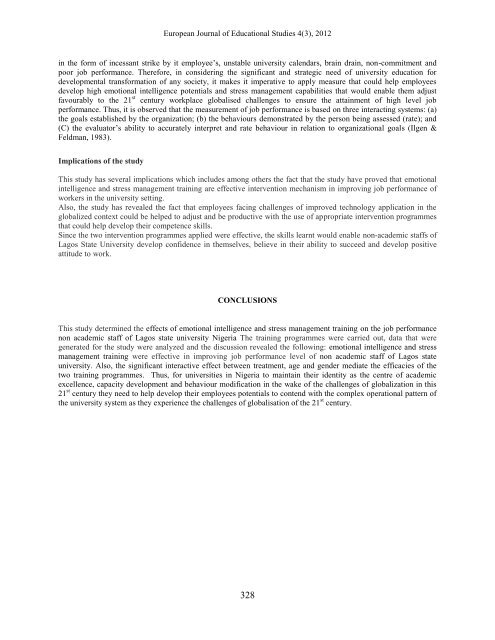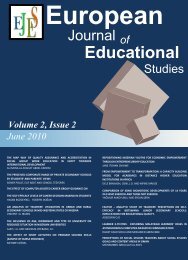Volume 4 Issue 3 (October 2012) - Ozean Publications
Volume 4 Issue 3 (October 2012) - Ozean Publications
Volume 4 Issue 3 (October 2012) - Ozean Publications
You also want an ePaper? Increase the reach of your titles
YUMPU automatically turns print PDFs into web optimized ePapers that Google loves.
European Journal of Educational Studies 4(3), <strong>2012</strong><br />
in the form of incessant strike by it employee‟s, unstable university calendars, brain drain, non-commitment and<br />
poor job performance. Therefore, in considering the significant and strategic need of university education for<br />
developmental transformation of any society, it makes it imperative to apply measure that could help employees<br />
develop high emotional intelligence potentials and stress management capabilities that would enable them adjust<br />
favourably to the 21 st century workplace globalised challenges to ensure the attainment of high level job<br />
performance. Thus, it is observed that the measurement of job performance is based on three interacting systems: (a)<br />
the goals established by the organization; (b) the behaviours demonstrated by the person being assessed (rate); and<br />
(C) the evaluator‟s ability to accurately interpret and rate behaviour in relation to organizational goals (Ilgen &<br />
Feldman, 1983).<br />
Implications of the study<br />
This study has several implications which includes among others the fact that the study have proved that emotional<br />
intelligence and stress management training are effective intervention mechanism in improving job performance of<br />
workers in the university setting.<br />
Also, the study has revealed the fact that employees facing challenges of improved technology application in the<br />
globalized context could be helped to adjust and be productive with the use of appropriate intervention programmes<br />
that could help develop their competence skills.<br />
Since the two intervention programmes applied were effective, the skills learnt would enable non-academic staffs of<br />
Lagos State University develop confidence in themselves, believe in their ability to succeed and develop positive<br />
attitude to work.<br />
CONCLUSIONS<br />
This study determined the effects of emotional intelligence and stress management training on the job performance<br />
non academic staff of Lagos state university Nigeria The training programmes were carried out, data that were<br />
generated for the study were analyzed and the discussion revealed the following: emotional intelligence and stress<br />
management training were effective in improving job performance level of non academic staff of Lagos state<br />
university. Also, the significant interactive effect between treatment, age and gender mediate the efficacies of the<br />
two training programmes. Thus, for universities in Nigeria to maintain their identity as the centre of academic<br />
excellence, capacity development and behaviour modification in the wake of the challenges of globalization in this<br />
21 st century they need to help develop their employees potentials to contend with the complex operational pattern of<br />
the university system as they experience the challenges of globalisation of the 21 st century.<br />
328

















